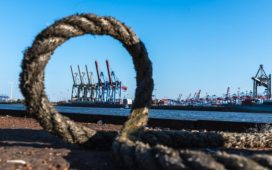“The process has been very smooth this time as we managed to reach a consensus with the Shenzhen authorities in a short period of time,” he said before his weekly Executive Council meeting, while thanking the mainland authorities for their support.
“It also shows that Hong Kong and Shenzhen are working together closely, sharing the same goals, and value the experience and feelings of residents and tourists.”
Shenzhen Bay control point at Hong Kong border ‘to operate 24 hours’ for holiday
Shenzhen Bay control point at Hong Kong border ‘to operate 24 hours’ for holiday
The Shenzhen Bay checkpoint, connecting the western areas of Hong Kong and Shenzhen, will be open 24 hours for a five-day period from Lunar New Year’s Eve on February 9 to 13.
The Lo Wu control point, which is connected to the East Rail line, will remain open until 2am on February 9 and 11, the latter date coinciding with the return of Hong Kong’s Lunar New Year fireworks after a four-year hiatus due to pandemic-related measures. The last train to Lo Wu will depart from Admiralty at 12.56am for both days.
Lee said extending operating hours at crossings served by rail links would help disperse passenger traffic.

Warner Cheuk Wing-hing, the city’s acting No 2 official, later told a press briefing that out of the 7.5 million cross-border trips, 80 per cent or 6 million would take place at Lo Wu.
He said the Lo Wu control point, which is served only by train, could not run around the clock because rail operator the MTR Corporation only had about two hours every night to conduct safety checks, repair and maintenance.
Secretary for Transport and Logistics Lam Sai-hung said: “We have minimised the time needed for regular checks and maintenance of rail services to cope with traveller demand.”
Cheuk said the government would put in place other measures to ensure sufficient manpower, including moving frontline staff from some checkpoints to those with extended operating hours and reducing staff days off.
Police and customs would monitor real-time traffic flow and adjust operations accordingly while the Transport Department would alert up-to-date traffic news through a coordinating centre.
The measures are part of efforts to avoid the repeat of the transport chaos that left thousands of mainland visitors stranded in Hong Kong after they watched the New Year’s Eve fireworks.
The Lok Ma Chau-Huanggang checkpoint is the only land crossing that regularly operates 24 hours.
Cheuk said the checkpoint would have a lane dedicated to public transport such as buses, franchised coaches, minibuses and taxis to avoid bottlenecks.
Both the Shenzhen Bay and Lo Wu crossings close at midnight on regular days, but the former is open 24 hours for freight vehicles.
Lawmaker Edward Lau Kwok-fan said he hoped the arrangements could be extended on a long-term basis.
“Our current checkpoints meet the conditions to provide longer service hours,” he said.
“Shenzhen Bay is the most qualified, since its cargo clearance is already operating 24 hours a day. We hope it can become an extra all-hours border on top of the Huanggang port for residents to choose from.”
He said that it was “a little disappointing” that the Lo Wu control point would only be extended until 2am.
But Fanny Yeung Shuk-fan, executive director of the Travel Industry Council, said that while the sector welcomed the measure, she believed the extensions at certain border checkpoints should be limited to major holidays.
“I think there are traffic issues that need to be considered if we were to do it long-term,” she said, adding it could also affect the local tourism industry since the goal was to have visitors stay longer and overnight.
“It would be too easy for them to leave,” she said.
Hong Kong minister ‘confident’ border crossings will extend holiday opening hours
Hong Kong minister ‘confident’ border crossings will extend holiday opening hours
She added that authorities would need to consider the availability of manpower, which could prevent them from operating more checkpoints, such as the Lo Wu crossing, for 24 hours.
Lawmaker Michael Tien Puk-sun said he was “very surprised and disappointed” that no special arrangements had been made for the Lok Ma Chau Spur Line-Futian control point, which shuts at 10.30pm.
“There is great demand for that port. They could have extended its hours a little more to close at midnight, which would not affect the MTR’s maintenance either,” he said.
“I’m guessing they may have manpower considerations that prevented them from doing it.”
Separately, Lee said he would discuss the economic effects of large-scale events on Hong Kong and the implementation of local national security legislation during a question and answer session at the Legislative Council on Thursday.
He said local events would not only bring visitors from around the world, but also boost the city’s competitiveness and business opportunities. He noted that every 1.5 million visitors contributed an about 0.1 per cent increase in gross domestic product.
Questions Lee wanted to explore with lawmakers included how to attract more large-scale events to Hong Kong, improve tourists’ experience and use the activities to draw in more visitors.
Replying to reporters, he emphasised that the government paid great attention to tourism development, adding visitor numbers had returned to 55 per cent of pre-pandemic levels, according to recent figures.
“We will spare no effort in driving our tourism industry, we are already doing it with great effort, continuously, and we will expand these efforts,” he said.
Additional reporting by Denise Tsang and Oscar Liu







